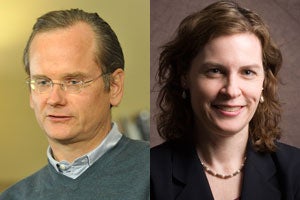Harvard Law School Professor Lawrence Lessig recently co-wrote an op-ed in the San Jose Mercury News on how new legislative templates by Google and Verizon threaten true net neutrality.
Lessig, the director of the Edmond J. Safra Foundation Center for Ethics at Harvard, and his co-author, Cardozo Law School Professor Susan Crawford, say now is the time for the FCC to use its authority to bring us closer to a neutral network.
Opinion: Google-Verizon should prompt FCC to demand Net Neutrality
Candidate Barack Obama told America that he believed in an open and “neutral” Internet — one where the owners of the wires didn’t get to pick and choose which applications would run on the network. Soon after Julius Genachowski was appointed as President Barack Obama’s choice to head the Federal Communications Commission, he outlined a clear and ambitious plan to turn that commitment into a reality.
But now Verizon and Google have struck a deal for a legislative template that would allow Verizon to be the gatekeeper for services running over its Internet Protocol pipe, and Google to be the colorful, well-branded winner. The outcome of this negotiation between Godzilla and Shamu may be good for them, but it would destroy the promise of a neutral network. The FCC needs to assert its authority if the chairman’s and president’s promises are to be kept.
If you’ve missed the early years of the net neutrality debate, here’s a thumbnail:
The market for high-speed Internet access has become enormously consolidated. Most Americans have very few choices; relative to the rest of the industrialized world, prices remain high and speeds remain low. Because of the hands-off policy of the FCC under President George W. Bush, we don’t have meaningful competition among broadband providers. And these giant carriers have every incentive to keep their prices high.
For this reason, Obama has long supported the idea that the carriers should not be able to choose who does well on their networks. New businesses should not have to ask permission before selling their services over the carriers’ lines, any more than a new television manufacturer should have to ask permission from a local utility before being allowed to plug into the electricity grid.
Instead, a principle of nondiscrimination has long governed electric utilities and telephone networks. And now that a single big pipe has taken the place of telephones and, increasingly, broadcast, the president’s platform called for similar nondiscrimination rules to be applied to Internet access.
To avoid this, lobbyists from the telephone and cable companies have put pressure on Capitol Hill to continue the policies of the Bush administration — policies that have seen America fall to 15th in rankings of Internet adoption among industrialized nations. Exploiting this regulatory vacuum, Verizon and Google have now decided that prioritizing certain online uses — think YouTube as the new HBO offered by Verizon — is just fine. Enshrining such a deal in legislation would dismantle the nondiscriminatory platform for innovation that our new all-purpose pipe has provided in the past.
